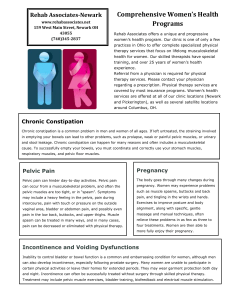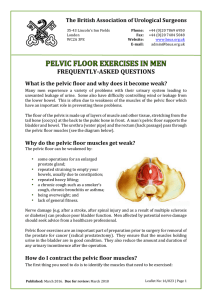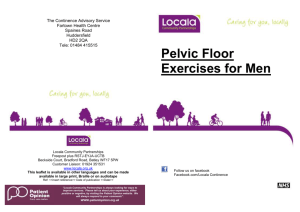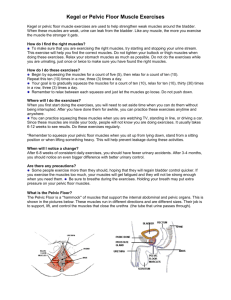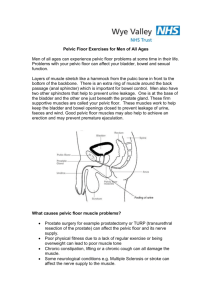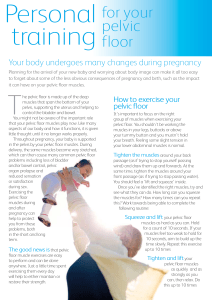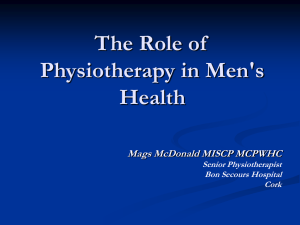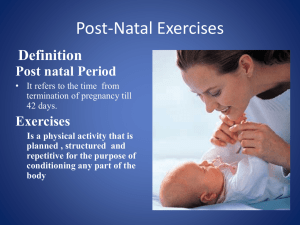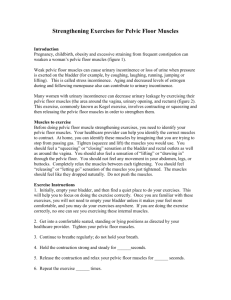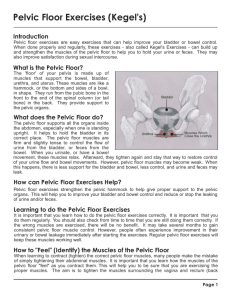pelvic floor women final leaflet
advertisement
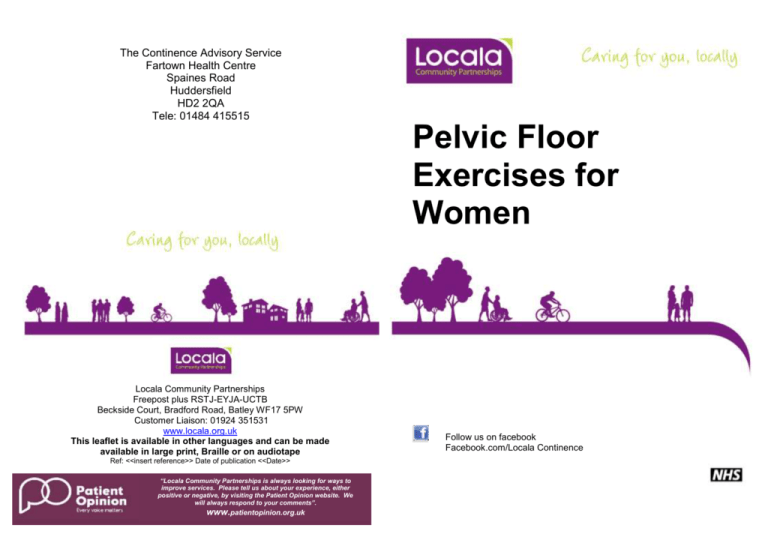
The Continence Advisory Service Fartown Health Centre Spaines Road Huddersfield HD2 2QA Tele: 01484 415515 Pelvic Floor Exercises for Women Locala Community Partnerships Freepost plus RSTJ-EYJA-UCTB Beckside Court, Bradford Road, Batley WF17 5PW Customer Liaison: 01924 351531 www.locala.org.uk This leaflet is available in other languages and can be made available in large print, Braille or on audiotape Ref: <<insert reference>> Date of publication <<Date>> “Locala Community Partnerships is always looking for ways to improve services. Please tell us about your experience, either positive or negative, by visiting the Patient Opinion website. We will always respond to your comments”. www.patientopinion.org.uk Follow us on facebook Facebook.com/Locala Continence Guide to pelvic floor muscle exercises for women Helpful Addresses and links : Where are the pelvic floor muscles and what do they do? Bladder & Bowel Foundation The pelvic floor muscles form the basin of your pelvis. They are attached between the bottom of your spine (the coccyx or tail bone) and the pubic bone at the front. They support the bladder, the womb (uterus) and the bowel. Pelvic floor muscles help to control when you pass urine and empty your bowels. These muscles should be firm and strong. If they are weak they will not provide support and control for your bladder and bowel. Pelvic floor muscles also have a role to play in controlling the symptoms of some types of prolapse. SATRA Innovation Park Rockingham Road Kettering Northants NN16 9JH Telephone 01536 533255 www.bladder&bowelfoundation.org PROMOCON 2001 Promoting Continence and Product Awareness Redbank House St Chad’s Street Cheetham Manchester Helpline 0161 834 2001 www.promocon2001.co.uk We value your opinion about our service. To comment visit; www.patientopinion.org.uk Some facts to be aware of: Why do pelvic floor muscles become weak? It’s easy to forget to do exercises There are many reasons why these muscles weaken: Try to tie them in with an activity you do every day e.g. cleaning your teeth Carrying extra load during pregnancy After childbirth Do not stop and start when passing urine as this can prevent your bladder emptying effectively A chronic or smokers cough Sometimes people notice an improvement within a few weeks but it may take longer than this before you notice a change. Don’t give up practicing your exercises Lack of general fitness Changes due to menopause and age Too much lifting heavy things Being constipated for a long time Being overweight High impact exercises put stress on your pelvic floor and may increase the risk of urine leaks. Tightening your pelvic floor muscles before and during an activity such as lifting will reduce the risk of leaking If your pelvic floor muscles are weak you may leak urine or faeces when you: Cough or sneeze Laugh Blow your nose Get up from a chair Exercise Lift, bend or stretch Your programme; How can I exercise my pelvic floor muscles correctly? During your examination the nurse or physiotherapist will have checked to make sure you are able to contract your pelvic floor muscles properly. Once you know how it feels to work these muscles start a regular exercise programme of fast and slow exercises at least 4 times a day You may also have been given a tailor made programme in line with the findings Slow exercises- will strengthen your muscles enabling them to support your bladder and bowel. Fast exercises- will train your muscles and reduce the risk of urine leaks when you cough, laugh or sneeze Start by; choosing a comfortable position with your knees slightly apart. tighten up your back passage as if trying to stop passing wind. at the same time tighten up as if trying to stop yourself passing urine. continue tightening and be aware of the feeling of lifting and squeezing these muscles. Try not to; clench your buttocks or squeeze your thighs together. hold your breath. You can check yourself by trying the following; hold a small mirror so you can see the area between your legs. tighten your pelvic floor muscles you should see the skin between the back passage and vagina lift and move away from the mirror. Date Slow exercise Hold Time Repetitions Fast exercise Lower stomach hold
